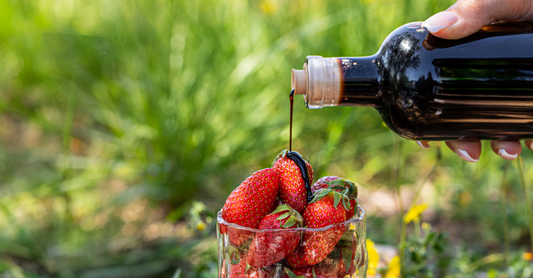A Mediterranean citrus fruit that is little known to the general public, bergamot, or Citrus Bergamia by its scientific name , has astonishing powers over our health, particularly our cholesterol levels.
A perfume fruit par excellence, this citrus fruit is also a valuable ally for our cardiovascular system. Its cold-pressed juice is packed with vital components for our bodies.
Presentation of bergamot
Native to Calabria, bergamot is a citrus fruit with a fragrant zest that is highly prized in perfumery. But that's not all, its juice, rich in antioxidants , vitamin C and bioflavonoids , including the precious naringin, makes it a fruit with multiple medicinal properties.
It is particularly recognized for its beneficial effect on lipid metabolism and the assimilation of fiber and pectin, two essential elements for good digestive health. Its essential oil, meanwhile, is a natural antiseptic.
An overview of general health benefits
Bergamot is a wealth of health benefits. Its richness in polyphenols, particularly genistein, gives it powerful antioxidant and anti-inflammatory properties.
Its lipid-lowering action allows it to effectively combat hypercholesterolemia and diabetes. It promotes an increase in good cholesterol (HDL) and a decrease in bad cholesterol (LDL). It also acts as a cholesterol regulator and contributes to lipid balance, thus helping to prevent cardiovascular disease.
Furthermore, bergamot has been identified as a natural statin , meaning it has the ability to lower blood cholesterol levels, similar to drugs commonly used in the treatment of cholesterol disorders. Finally, bergamot helps fight obesity by facilitating better assimilation of lipids and promoting a healthy diet.
The little-known power of bergamot on cholesterol
Bergamot , a citrus fruit from the Citrus family, is primarily grown in the Mediterranean region of Calabria. It is often used in perfumery for its rich, fragrant essential oil obtained by cold-pressing the zest.
However, bergamot juice is also a powerful and natural health elixir. It contains a high concentration of bioflavonoids, antioxidants, vitamin C, and polyphenols.
These components, particularly naringin and genistein, have a lipid-lowering effect on our bodies. They help regulate lipids, reducing bad cholesterol, or LDL, while increasing good cholesterol, or HDL.
Understanding Cholesterol: Good and Bad Cholesterol
Cholesterol is a fatty substance needed by our bodies to produce hormones, vitamin D and bile acids that aid digestion.
There are two types of cholesterol: LDL (low-density cholesterol), often referred to as "bad cholesterol" because it can build up in the arteries and contribute to cardiovascular disease, and HDL (high-density cholesterol), the "good cholesterol," which helps remove LDL from the body, reducing the risk of heart disease.
Lipid balance is therefore essential for cardiovascular and liver health.
How Bergamot Juice Affects Cholesterol
Bergamot juice has been shown to have lipid-lowering and antioxidant properties. It acts as a cholesterol regulator, helping to lower LDL and raise HDL.
The polyphenols in bergamot juice , particularly naringin and genistein, appear to inhibit lipid absorption and reduce blood triglycerides. Additionally, pectin, a fiber found in bergamot, and beta-sitosterol, a plant compound, help control cholesterol.
Additionally, bergamot juice can help fight obesity and diabetes, two major factors in high cholesterol. Furthermore, thanks to its rich antioxidant content, bergamot has anti-aging and anti-inflammatory effects, thus supporting cardiovascular health.
How to incorporate bergamot into your diet to control cholesterol
Bergamot citrus fruit (Citrus bergamia), a Mediterranean gem, particularly from Calabria, is a powerful but little-known ally for cardiovascular health .
This valuable source of polyphenols , bioflavonoids and vitamin C acts synergistically to regulate lipid metabolism. It promotes the increase of HDL cholesterol (the "good" cholesterol) and the reduction of LDL (the "bad" cholesterol).
The presence of pectin and beta-sitosterol in bergamot makes it a natural cholesterol regulator.
Add the bergamot juice in a balanced diet not only helps fight high cholesterol , but also contributes to optimal cardiac well-being.
The different ways to consume bergamot
Bergamot , a powerful antioxidant , offers numerous benefits for overall health and well-being . Its juice, cold-pressed to preserve valuable polyphenols and flavonoids , can be consumed alone or incorporated into smoothies for a dietary approach to nutrition .
Bergamot zest, rich in essential oil and naringin , can be added to salads or desserts for a touch of acidity.
In herbal medicine, bergamot can be infused, providing digestive and anti-inflammatory benefits, thus helping to maintain the health of the cardiovascular system.
Simple and healthy recipes with bergamot
Many dishes can be enhanced with a touch of bergamot. A simple example is a citrus salad, where bergamot slices are tossed with oranges, grapefruit, and a drizzle of balsamic vinegar.
For a healthy dessert, try a bergamot tart, where bergamot juice and zest are combined with honey and a walnut-based crust.
Finally, bergamot and chamomile tea can be a great way to end the day, taking advantage of the calming and digestive properties of these two plants. These recipes are not only delicious, but they also promote good cardiovascular health by helping to control cholesterol.
Citrus bergamia , more commonly known as bergamot , is a Mediterranean citrus fruit that is packed with health benefits. The bioflavonoids, polyphenols, and vitamin C it contains act as powerful antioxidants.
Cold-pressed bergamot juice is a valuable source of pectin, a soluble fiber that plays a crucial role in lipid absorption and cholesterol regulation. It is also rich in naringin and beta-sitosterol, compounds that help increase HDL (the "good" cholesterol) and lower LDL (the "bad" cholesterol).
These properties make bergamot a potential natural lipid-lowering agent , an interesting alternative to statins for combating high cholesterol. In addition, the genistein present in bergamot contributes to lipid balance and could be useful in the fight against obesity.







 lucangeli.it
lucangeli.it